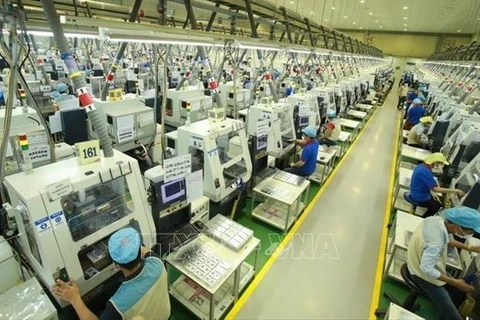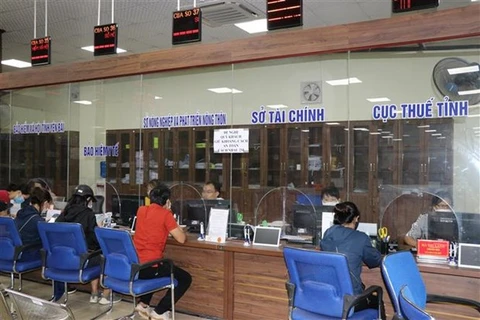Hanoi ( VNA) - Vietnam’s economic prospects greatly depend on COVID-19 vaccination speed and scale, the efficiency of pandemic prevention and control measures and the effectiveness of supporting packages, held experts at a conference organised by the Vietnam Economic Strategy Studies Centre (VESS) on October 18.
They asserted that bad debts may continue to rise, becoming a threat for the financial system in the post-pandemic period. Therefore, they stresses the need to prepare for worst-case scenarios.
Dr. Nguyen Duc Thanh, VESS Director said that slow vaccination has held Vietnam back in recovery process in 2021, which can lead to it losing comparative advantage. Currently, Vietnam’s vaccine coverage remains low compared to the world's level, he noted.
The resurgence of COVID-19 has disrupted supply chains and affected the labour market, posing severe impacts on domestic businesses, he said, adding that the growth in the first nine months of this year did not reflect difficulties of the economy, especially the informal sector.
Assoc. Prof. Dr. Pham The Anh, chief economist of the VESS, said that due to the pandemic, demands were low and the transport of goods was difficult. However, the risk of inflation is high.
He explained that enterprises are shouldering from rises in inputs, from petrol prices to anti-pandemic costs, which will sooner or later be included in products' prices. Therefore, when social activities are resumed and demand rises, the rising costs will result in inflation.
They asserted that bad debts may continue to rise, becoming a threat for the financial system in the post-pandemic period. Therefore, they stresses the need to prepare for worst-case scenarios.
Dr. Nguyen Duc Thanh, VESS Director said that slow vaccination has held Vietnam back in recovery process in 2021, which can lead to it losing comparative advantage. Currently, Vietnam’s vaccine coverage remains low compared to the world's level, he noted.
The resurgence of COVID-19 has disrupted supply chains and affected the labour market, posing severe impacts on domestic businesses, he said, adding that the growth in the first nine months of this year did not reflect difficulties of the economy, especially the informal sector.
Assoc. Prof. Dr. Pham The Anh, chief economist of the VESS, said that due to the pandemic, demands were low and the transport of goods was difficult. However, the risk of inflation is high.
He explained that enterprises are shouldering from rises in inputs, from petrol prices to anti-pandemic costs, which will sooner or later be included in products' prices. Therefore, when social activities are resumed and demand rises, the rising costs will result in inflation.
According to Thanh, in an optimistic scenario when pandemic prevention and control measures are effective and production is resumed from the fourth quarter, and vaccination is expanded in the rest of the year, GDP growth may reach about 1.8 percent.
However, in a less optimistic scenario when COVID-19 returns in some localities, making the transport of goods difficult, while orders continue to leave Vietnam, production chain is broken, there is a lack in labourers and input cost rises, the GDP growth may only stand at 0.2 percent, said Thanh.
Thanh held that in order to ensure economic expansion is reached as predicted in the optimistic scenario, it is necessary to speed up vaccination process and expand its scale to all localities, and tackle difficulties in goods transport.
Thanh asserted that monetary policies should be designed to meet the demand for credit of the economy along with risk-managing measures./.
However, in a less optimistic scenario when COVID-19 returns in some localities, making the transport of goods difficult, while orders continue to leave Vietnam, production chain is broken, there is a lack in labourers and input cost rises, the GDP growth may only stand at 0.2 percent, said Thanh.
Thanh held that in order to ensure economic expansion is reached as predicted in the optimistic scenario, it is necessary to speed up vaccination process and expand its scale to all localities, and tackle difficulties in goods transport.
Thanh asserted that monetary policies should be designed to meet the demand for credit of the economy along with risk-managing measures./.
VNA
























